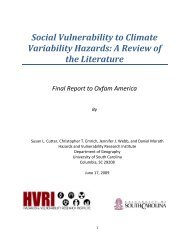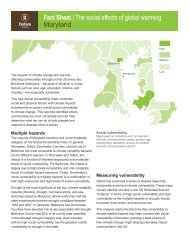Poverty Footprint Study on how the Coca Cola - Oxfam America
Poverty Footprint Study on how the Coca Cola - Oxfam America
Poverty Footprint Study on how the Coca Cola - Oxfam America
Create successful ePaper yourself
Turn your PDF publications into a flip-book with our unique Google optimized e-Paper software.
ase of <strong>the</strong> pyramid, achieve a development impact4 and create new c<strong>on</strong>sumer markets.<br />
Fur<strong>the</strong>rmore, businesses are increasingly working<br />
in partnership with governments and civil society<br />
organizati<strong>on</strong>s to find multi-stakeholder soluti<strong>on</strong>s to<br />
comm<strong>on</strong> challenges. Ec<strong>on</strong>omic growth requires an<br />
enabling envir<strong>on</strong>ment including good governance,<br />
robust regulati<strong>on</strong> and enforcement practices, and<br />
clear accountability mechanisms. Toge<strong>the</strong>r <strong>the</strong>se<br />
elements provide a framework for governments to<br />
lead <strong>on</strong> poverty reducti<strong>on</strong> in partnership with business<br />
and civil society. This study aims to bolster that sort of<br />
collective problem-solving.<br />
This report is <strong>on</strong>e such instance. This study is <strong>the</strong><br />
output of a multi-year collaborati<strong>on</strong> am<strong>on</strong>g The<br />
<strong>Coca</strong>-<strong>Cola</strong> Company (all references to The <strong>Coca</strong>-<br />
<strong>Cola</strong> Company refer also to any direct or indirect<br />
subsidiaries that are relevant for purposes of this<br />
report), <strong>Oxfam</strong> <strong>America</strong> and SABMiIIer to apply<br />
<strong>Oxfam</strong>’s <str<strong>on</strong>g>Poverty</str<strong>on</strong>g> <str<strong>on</strong>g>Footprint</str<strong>on</strong>g> Methodology to <strong>the</strong><br />
<strong>Coca</strong>-<strong>Cola</strong>/SABMiIIer value chain in Zambia and<br />
El Salvador. This methodology, which was originally<br />
developed and applied to Unilever’s operati<strong>on</strong>s in<br />
Ind<strong>on</strong>esia, is designed to help companies understand<br />
and improve <strong>the</strong>ir poverty impacts, and provides a<br />
platform for dialogue, innovati<strong>on</strong> and accountability.<br />
Zambia and El Salvador were chosen for this study<br />
because of <strong>the</strong>ir sociopolitical diversity and <strong>the</strong>ir<br />
significant sugar industries, which allowed visibility<br />
into <strong>the</strong> entire <strong>Coca</strong>-<strong>Cola</strong>/SABMIller value chain, from<br />
agricultural producers to bottlers to local c<strong>on</strong>sumers.<br />
Industrias La C<strong>on</strong>stancia (ILC) in El Salvador and<br />
Zambian Breweries in Zambia are <strong>the</strong> names of <strong>the</strong><br />
local SABMiller operati<strong>on</strong>s in each country.<br />
Both countries have very high levels of poverty.<br />
Despite recent ec<strong>on</strong>omic growth, Zambia is <strong>on</strong>e of<br />
<strong>the</strong> poorest countries in <strong>the</strong> world, characterized by<br />
low life expectancy, high HIV/AIDS infecti<strong>on</strong> rates and<br />
a poorly diversified ec<strong>on</strong>omy. El Salvador is equally<br />
am<strong>on</strong>g <strong>the</strong> poorest countries in Latin <strong>America</strong> and<br />
is still recovering from a decade-l<strong>on</strong>g civil war and<br />
extreme exposure to natural disasters5 .<br />
Recommendati<strong>on</strong>s are made at <strong>the</strong> end of each<br />
secti<strong>on</strong> of this report for The <strong>Coca</strong>-<strong>Cola</strong> Company<br />
and SABMiller’s c<strong>on</strong>siderati<strong>on</strong> going forward.<br />
These recommendati<strong>on</strong>s should be seen as guiding<br />
principles and suggesti<strong>on</strong>s for acti<strong>on</strong>, and not as<br />
formal commitments made by ei<strong>the</strong>r The <strong>Coca</strong>-<strong>Cola</strong><br />
Company or SABMiller. Both organizati<strong>on</strong>s are<br />
committed to engaging with key stakeholders in each<br />
country to begin to address <strong>the</strong>se important issues.<br />
Key findings<br />
Macroec<strong>on</strong>omic impacts<br />
An examinati<strong>on</strong> of <strong>the</strong> <strong>Coca</strong>-<strong>Cola</strong>/SABMiller value<br />
chain’s macroec<strong>on</strong>omic impacts reveals that its<br />
Gross Value Added (GVA) in 2008 was approximately<br />
$21 milli<strong>on</strong> in Zambia and $83 milli<strong>on</strong> in El Salvador.<br />
In additi<strong>on</strong>, <strong>the</strong> <strong>Coca</strong>-<strong>Cola</strong>/SABMiller value chain<br />
supported an estimate of more than 3,741 formal<br />
and informal jobs in Zambia and 4,244 formal jobs<br />
in El Salvador.<br />
In both countries, <strong>the</strong> formal jobs linked to <strong>the</strong> <strong>Coca</strong>-<br />
<strong>Cola</strong>/SABMiller value chain are in n<strong>on</strong>farm supplies,<br />
bottling, distributi<strong>on</strong> and sales. However, as in many<br />
developing countries, <strong>the</strong> majority of jobs in <strong>the</strong><br />
value chain are in <strong>the</strong> informal sector, ei<strong>the</strong>r in<br />
sugar harvesting or in <strong>the</strong> retailing of <strong>Coca</strong>-<strong>Cola</strong><br />
products. The system supports a sizable small-scale<br />
retail sector in both countries, with approximately<br />
64,000 outlets in El Salvador and approximately<br />
25,000 in Zambia.<br />
Owing to <strong>the</strong> relatively small size of <strong>the</strong> ec<strong>on</strong>omy<br />
and weak supply base, in some circumstances,<br />
supply purchases in both countries are made ei<strong>the</strong>r<br />
regi<strong>on</strong>ally or internati<strong>on</strong>ally.<br />
Recommendati<strong>on</strong>s for follow-up acti<strong>on</strong><br />
C<strong>on</strong>vene community stakeholders<br />
and business partners in focused<br />
discussi<strong>on</strong>s <strong>on</strong> <strong>the</strong> barriers to local<br />
sourcing and opti<strong>on</strong>s to address<br />
<strong>the</strong>se barriers.<br />
Create a process to capture and share<br />
best practices am<strong>on</strong>g small and medium<br />
enterprises (SMEs) in <strong>the</strong> <strong>Coca</strong>-<strong>Cola</strong><br />
system to more broadly foster c<strong>on</strong>tinual<br />
improvement am<strong>on</strong>g local businesses<br />
and c<strong>on</strong>tribute to <strong>the</strong> development of<br />
local industry<br />
Engage with NGOs and financial groups<br />
to discuss providing microcredit to<br />
SMEs in <strong>the</strong> <strong>Coca</strong>-<strong>Cola</strong> system, perhaps<br />
with a particular focus <strong>on</strong> women.<br />
Exploring <strong>the</strong> links between internati<strong>on</strong>al business and poverty reducti<strong>on</strong> 13




